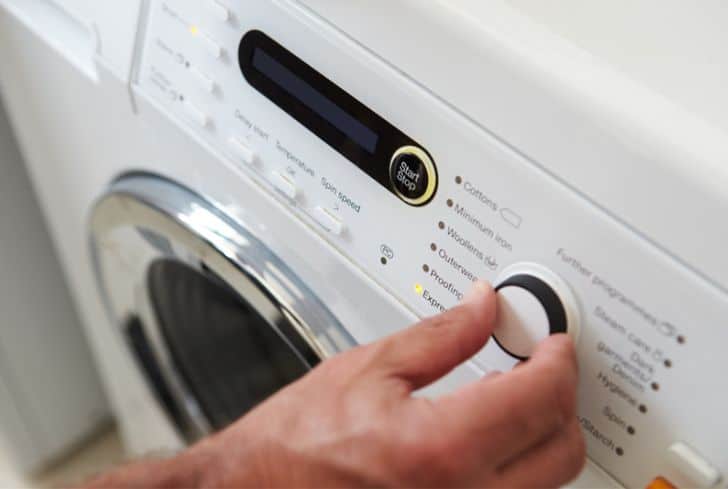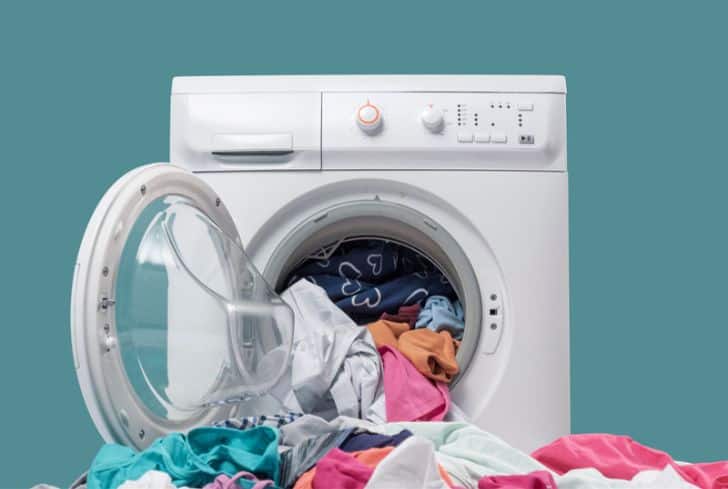If you want a washing machine, it is normal to wonder how many amps and watts it uses. You want to buy the ideal machine for your budget, electricity-wise. There are many innovations and brands, so some will consume more energy than others.
How many amps and watts does a washing machine use? The answer will surprise you! If you also want to know if you can use an extension cord for your washing machine or perhaps even dedicate a circuit to it, you should still be around. This article will also inform you about the right amp breaker you need to maintain your gadget.
How Many Amps Does a Washer Use?
The average washing machine uses between 5 to 20 amps for each load of laundry. It depends on the brand and bells and whistles the device is equipped with. You can find the precise number on the silver-colored sticker on the body of the washer.
An amp is the measurement of electrons that flows into an electrical appliance, like a washer. You also need to know that there are different sizes of washing machines. They weigh between 5kg to 14kg, and each can carry different amounts of clothes. So, the size you purchase depends on your household size.
A 6kg or 7kg washing machine will do enough clothes in a single load if you have a smaller home. You can also opt for a larger capacity or size, such as a 10kg washer.
Of course, these devices will not consume the same amount of amps, and the other features you employ also determine the consumption rate. But the average washer will not go above 20 amps.
By cutting back on features like hot water and doing your laundry in full loads, you can minimize the energy consumption of this gadget.
How Many Watts Does a Washing Machine Use?
The number of watts a washing machine uses depends on the brand and additional services. However, the average washing machine needs between 400 to 1500 watts for each hour of use. The washer’s size also determines the energy consumption rate; a smaller device means less kWh.
Depending on the size of your washer, you can use between 400 to 1500 watts of electricity. The larger options may consume more, while smaller ones consume less. For instance, a 7kg Whirlpool washing machine requires 340 watts of electricity for each hour of use, but this is more typical in a smaller household.
On the other hand, a larger one, say 10 to 12kg, will sap more. Again, this depends on how you operate the device. Of course, you can expect it to consume more electricity if you run it frequently, and using features like the heater will certainly increase the amount you pay for energy at the end of the month.
Typically a washing machine requires only thirty percent of its energy consumption for washing your clothes. The remaining seventy percent goes into heating water for each load of laundry.
However, if you aim to reduce your energy consumption, hot water for your clothes is something you can do without. The machine will clean the articles well, so you can ditch the hot water feature.
Can I Use an Extension Cord to Connect My Washing Machine?
Yes, you can use an extension cord for your washing machine, but it is usually best to avoid it. Before choosing an extension cord for your washing machine, there are several factors you need to consider to ensure an optimal condition for the device.
An extension cord can help in cases where the washing machine’s cord is not long enough to reach the socket dedicated to doing laundry. In that case, you will consider using an extension cord, which isn’t a bad idea.
However, you must be conscious of the environment you expose your electrical appliances too, especially one that is as large and powerful as a washing machine. Compared to the average household appliance, you will agree that the laundry machine requires more attention and dedication, including the power outlet you allocate.
It is best to provide a dedicated circuit to devices of this magnitude, and when using an extension cord, you will do well to ensure that it has the shortest possible cord.
This ensures consistency when drawing power to run the washing machine. The longer the cord, the higher the chances of discrepancies in the wattage and energy that reaches the device. You want to maintain consistency, but even more importantly, you need to ensure that the ampere rating for the extension cord correlates with that of the washing machine.
In other words, avoid using an extension cord of lower amps. If your washing machine uses 10 to 15 amps, you should reserve an extension cord of equal or higher rating (10 to 15 amps is also good).
Does a Washing Machine Need to be on a Dedicated Circuit?
Yes, it is advisable to put your washing machine on a dedicated circuit if you want to prolong the lifespan of your investment. The reason is that power surges are real and damage devices of this magnitude. Of course, it will not happen at once, but the impact becomes telling with time.
A washing machine or any device with a significant power rating requires a dedicated circuit to prevent short circuits and other electrical-related issues. It ensures enough power to prevent a short circuit or other electrical disturbances.
Any gadget that works with a high voltage should not share a dedicated circuit with another device, especially if it also has a powerful performance rating. Therefore, a dryer and washing machine may not be placed on the same power source, especially if it is an electric heat dryer in question.
They pull high amperage individually and should get their dedicated circuits.
What Amp Breaker do You Need for a Washing Machine?
A washing machine uses between five to twenty amps of electrical current. The rule of thumb is to allow an additional allocation of amperage when choosing a circuit for a powerful appliance.
For a ten-amp washing machine, use a 15-amp breaker. Avoid leaving too many additional amps to prevent overheating. You can also use a ten-amp breaker for a ten-amp washing machine.
However, the most important thing is to avoid using a lower amp circuit breaker for your devices, even those that are not nearly as high-performance.

Does a Washing Machine Need 15 or 20 Amps?
It depends on the amperage rating of the washing machine. If it is a 15-amp appliance, you can use a 15-amp or 20-amp breaker to power it. On the other hand, if it is a 20-amp appliance, you can use a 20-to-30-amp breaker.
The number of amps your washing machine needs depends on its amp rating. You will find it somewhere on the body of the appliance, or you can visit Amazon or the manufacturer’s website for more information.
But now that you know the average washing machine consumes between five to twenty amps, you need to choose dedicated breakers with a close numerical value to prevent electrical disturbances.
For instance, if the washing machine requires seven amps, you can choose a dedicated circuit of ten amps. Never go lower than seven amps.
Again, if your washing machine uses 15 amps, you can choose a 15-amp circuit breaker. You are still in the clear because they balance each other perfectly. There is no shortage or excessive ampere.
Similarly, you can use a 15-amp washing machine with a 20-amp breaker. The 5 amp difference is barely enough to encourage overheating.
Factors affecting the Energy Consumption of Washing Machines
Let’s take a look at the factors that affect the energy consumption of a washing machine:
Using the heater
The heater is the largest consumer of electricity in the components of the washing machine. If yours has the option of washing your clothes with hot water, it requires additional energy to heat the water.
This is because the hot water comes from an internal source. It takes 70 percent of the energy consumption for this appliance. To reduce energy consumption for a washer, use cold water to wash your clothes.
There is little to no difference most of the time.
Using the spin dryer
If you have decided to use the spin dryer for your washing machine, it will also increase energy consumption. This is because dryers require heat to remove excess moisture from your clothing.
Heat energy is also a high consumer of energy.
The number of times you do laundry
How many times do you do your laundry weekly? Instead of washing clothes individually or in small batches, putting as many as possible in a single load is best. If that entails waiting to gather your clothes for a single day of laundry weekly, go ahead.
Conclusion
Are you looking to cut back on your energy use? It is becoming inevitable, considering prices are skyrocketing, and the environment also needs our help.
This article has explored the wattage and amperage consumption of a washing machine. Your ultimate energy consumption will depend on how often you use it and the functionalities you include.






